It’s no surprise that many college students don’t get a lot of sleep, especially freshmen living in the residence halls. But some students may not realize the benefits that could come from actually getting enough sleep: performing better in school and living a healthier lifestyle.
A UA study found that the average UA student sleeps 6 hours and 47 minutes each night. Adolescents could actually use 9.25 hours of sleep, but almost nobody gets that much, said Dr. Kathryn Orzech, a postdoctoral fellow in psychiatry and human behavior at Brown University who worked on the study.
The study used a different sample size of participants each year. In 2005, there were 1,823 and in 2007, there were 675. All participants were on-campus residents and were mostly freshmen.
Sometimes people can be very loud and distracting in the dorms, but getting to sleep isn’t usually a problem for Ryan Lee, a pre-business freshman.
Lee said he gets about eight hours of sleep each night. However, his roommate has had some sleep issues lately due to noise coming from neighbors every now and then, Lee said.
But if you consistently need to rely on an alarm to wake you up in the morning, you’re not getting enough sleep, Orzech said.
Kat Ferguson, a pre-physiology freshman, said she gets about six to seven hours of sleep each night and doesn’t need an alarm to wake up. Ferguson has a roommate and lives in the dorms, which she said can sometimes be distracting but for the most part it’s easy for her to sleep. She said she prioritizes her sleep because if she didn’t, she wouldn’t be able to focus as well in her classes.
The most common issue among UA students was feeling unprepared the next day, Orzech said.
“There were some students who said their sleep was really terrible,” Orzech said.
Some common factors for students getting poor sleep are dorm noise, roommates, homework and working outside of school, said David Salafsky, one of the co-authors of the study and director of Health Promotion and Preventive Services. Lee Ann Hamilton is the other co-author.
“All of those things really take up a lot of time and make pretty significant demands on students,” Salafsky said.
Brooke Warren, an education junior, gets between five and seven hours of sleep, depending on the night, she said. She had a harder time sleeping her freshman year in the dorms, but now that she is a junior living off campus, she has her own room and it’s easier.
“People are kind of worrying about things they don’t have done, and that can be an impediment to getting a good night’s rest,” Salafsky said.
The Pittsburgh Sleep Quality Index, which was used for the study, examines sleep quality in many different populations, including college students, Orzech said.
“And that was how we got an idea of how they (students) perceived their sleep,” she said.
The survey also asked students if they would come to Campus Health Service for an in-person interview and about 500 said yes, Orzech said.
“For Campus Health, we found out that people who were answering questions about sleep also were willing to answer some questions about their physical and mental health,” she said.
Some things that can aid students in sleeping better are taking the time to de-stress, or being physically active is useful in getting them ready for sleep and reducing stress from the day, Salafsky said.
“Another thing that helps is having a consistent bedtime and wake time, which again, for college students is very hard because you have a different class schedule every day and on the weekends you want to stay up later,” Orzech said. “But it really throws your body off.”
Students, especially freshmen, are living in a very social environment and are away from home for the first time, Salafsky said. “Sleep tends to get crowded out.”
Orzech said napping during the day can help, but the trick is not doing it for long periods of time. It is good to shoot for less than 45 minutes.
“If you’re doing a nap that’s like two or three hours long, you’re probably going to mess up your ability to go to sleep the next night,” she said.
Salafsky and Orzech agree that it is worth it to make time to get a good night’s rest, even though it is hard in a college atmosphere. Students can help their sleep by being prepared for the next day, exercising, eating meals at regular times and having a more regular sleep schedule, Orzech said.
“Sleep just needs kind of a bit of a marketing boost,” Salafsky said.









